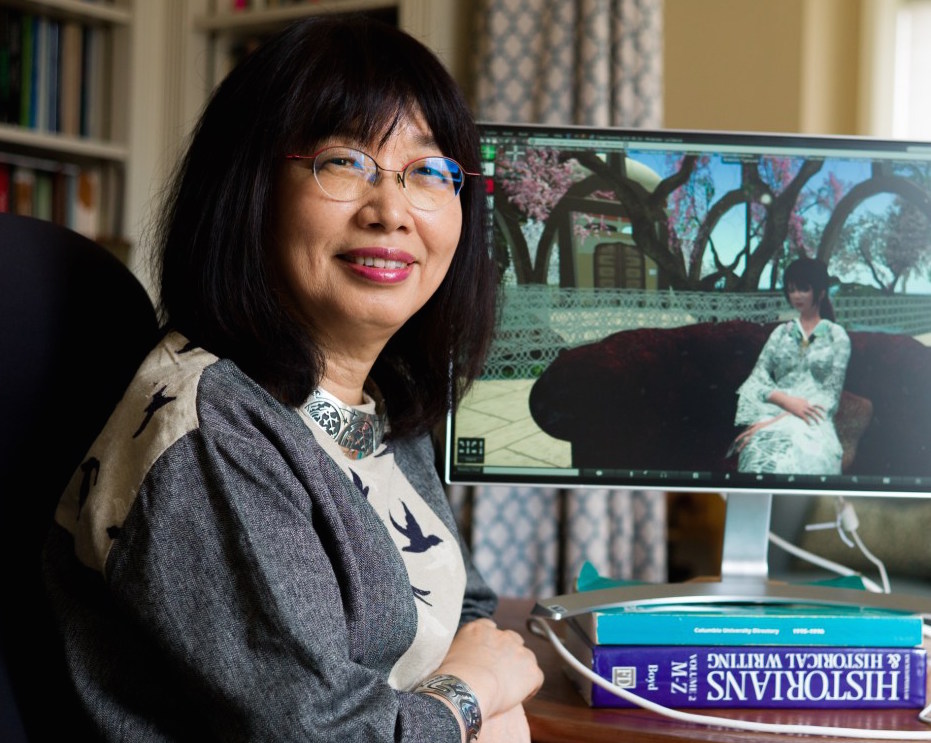
NSSR’s Eiko Ikegami Researches Autistic Communities in the Virtual World
In their study of autism spectrum disorder (ASD), researchers have devoted most of their attention to the diagnosis and treatment of children.
As a result, says Eiko Ikegami, Walter A. Eberstadt Professor and professor of sociology at The New School for Social Research, researchers know very little about the lives of adults with autism — and even less about the way they interact with one another.
Ikegami wanted to flip the script on ASD research and zero in on adults living with the condition. To that end, she went to a place that happens to be a decade-long focus of her ethnographic research: the online virtual world of Second Life. It’s there that adults on the autism spectrum gather to hang out and be themselves.
As Ikegami discovered, Second Life is ideally suited to people with autism, as it allows users to come and go as they please — a means of avoiding the real-world threat of sensory overload, a common affliction for people with the disorder. Assuming the form of Kiremimi Tigerpaw, her Second Life avatar, Ikegami interacted with adult autistic people in virtual environments.
Of all the discoveries she made about these individuals, Ikegami was most intrigued by the “incredible richness of their mental life.”
“Although I entered with the expectation of studying people with a disorder, I acquired a heightened appreciation of the neurodiversity among human beings,” Ikegami says. “While people with autism have difficulty with some things that are easy for us neurotypicals, as they call us, they excel in other things to which we are insensitive.”
Ikegami has channeled her research and findings into her innovative new Japanese-language book, Hyper-World: Autistic Avatars in Virtual World (an expanded English version of the book is forthcoming). It is supplemented by a blog, published on her website, that details her interactions with autistic people on Second Life and in-person meetings with them across the United States. Her trip was documented by NHK, Japan’s national public broadcasting organization, for a two-part documentary, The World of Autistic Avatars.
During her two-week trip, Ikegami scheduled hours of face time with her autistic friends from Tennessee to Wyoming to California. But they had their most productive conversations on the Internet. As Ikegami notes, because of their “different mental functioning, many autistic people see, hear, touch, or smell the world in ways that differ from those of neurotypicals.” Most crucially, the majority of people on the autism spectrum are unusually sensitive to sensory information. Unlike the real world, Second Life allows its inhabitants to control sensory input and to freely express themselves through the creative use of avatars (furthermore, no one is required to read subtle “social cues”). If an autistic Second Life user becomes overwhelmed, he or she can simply turn off his or her computer.
“Being able to turn down the sound, prevent people coming up to me; not having the movement of air or smells, pollen, insect sounds, intensity of light; being able to be supported in a chair — not falling almost all the time and having to brace myself against objects or be horizontal — yet still being able to move in a space and explore is hugely beneficial,” one user told Ikegami. “This is coupled with the fact that I seem to communicate far more fluently via text than I can by speech.”
The rules of communication in the real world have been made to accommodate the preferences of neurotypical people, Ikegami explains. In virtual worlds, however, “there are technologically defined spaces that democratize the rules of communication and allow autistic and neurotypical people to socialize as equals,” she says.
Given the opportunity, autistic adults have a lot to say. During her trip, Ikegami met Malachi and his friend Jenny, who discussed their lives as members of both the LGBTQ and autistic communities in El Centro, California; Cora of Little Rock, Arkansas, who shared her “activist outlook” on autism and her experiences of sensory and emotional “melt-down”; and Larre of Jackson Hole, Wyoming, who talked about his life as a musician and trance music DJ (in Second Life) and a merchandise clerk at a local supermarket (in real life). Each person conveyed his or her appreciation for the freedom of expression allowed in virtual worlds.
The experience of autistic individuals on Second Life resonated with Ikegami. Upon moving from Japan to the United States to study sociology at Harvard, her ability to speak or understand English was limited, leaving her with the feeling of being “a self-confined autistic child.”
“Many autistic children have in fact rich mental worlds, even when they cannot express themselves well; When I moved to the United States, I also had a lot to say, but I could not express myself effectively in a new environment,” she says.
Expressing herself not only meant learning a new language, but also breaking with cognitive assumptions rooted in “the culturally defined ways of feeling, sensing, and viewing” with which she grew up.
“It was quite a frustrating experience,” she adds, “but it was curiously enriching.”
She felt a similar sense of exhilaration conducting ethnographic research with autistic people. Just as immersing herself in a new culture led her to “break the boundaries of my cognitive framework,” so too did “interacting with neurologically different people.”
Ikegami hopes that through her research, others will come to the same realization — and, in turn, “come to a new level of reflection regarding the depths of our cognitive experience, and appreciating diversity in human intelligences.”
“Knowing oneself is a counsel of various philosophies and religions around the world,” she says. “Paradoxically, however, we often come to know ourselves better only when we interact with and try to know ‘others’; we are able to touch the unseen parts of ourselves only when others hold up a mirror to us.”